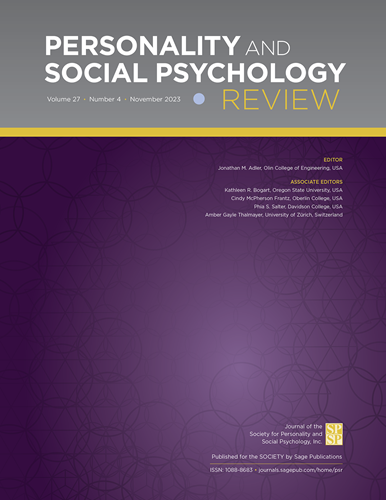边缘化和去边缘化的个人和社会动态。
IF 10.4
1区 心理学
Q1 PSYCHOLOGY, SOCIAL
引用次数: 0
摘要
学术摘要本文探讨了印度边缘化与去边缘化的复杂过程,重点关注贱民(印度语中被压迫者)的经历。印度的种姓制度的特点是“等级不平等”,使低种姓的人无法实现经济平等,并剥夺他们获得机会和资源的机会。尽管印度宪法禁止种姓歧视,但种姓歧视很普遍,对人们的生活产生了广泛的影响,包括他们的生计、自我意识、教育和健康。本文提出了文化上适当的框架,代表了印度受压迫群体的独特经历,并批评了有关种姓的社会心理学进展缓慢。强调边缘化的复杂性以及种姓、性别和社会经济问题相互作用的方式,本文提出了一个理解基于种姓的边缘化和去边缘化的整体框架。该框架借鉴了印度两位标志性社会思想家甘地和安贝德卡的见解,将自上而下的制度变革与自下而上的社区赋权努力相结合,以实现去边缘化。为了解决边缘化的文化和心理问题,必须结合土著知识和非殖民化观点。该报告呼吁采取一种全面的方法,通过教育、游说和文化保护赋予弱势群体权力,同时承认基于种姓的排斥的历史和结构根源。正在进行的消除边际化的努力对于创造一个更平等的社会和消除长期存在的不平衡是至关重要的。本文深入研究了印度种姓制度背景下边缘化和去边缘化的复杂动态,特别关注贱民(印度语中被压迫者的意思)的经历。尽管有宪法保护,但基于种姓的歧视仍然普遍存在,影响着生活的各个方面,包括生计、身份、教育和健康。本文提出了一个理解边缘化的综合模型,强调了边缘化的多面性以及种姓、性别和社会经济因素的相互作用。本文以印度两位有影响力的人物甘地和安贝德卡的思想为基础,提出了一个模型,该模型提出了一种双重的去边缘化战略,将自上而下的制度改革与基层社区赋权倡议相结合。有人认为,土著知识和非殖民化观点的结合对于解决边缘化的心理和文化层面至关重要。该文件强调,去边缘化不是一个线性过程,而是需要一种促进尊严、平等和正义的变革方法。通过认识基于种姓的排斥的历史和结构根源,本文提倡一种整体的方法。持续不断的努力对于消除根深蒂固的不平等和促进一个更公平的社会世界至关重要。本文章由计算机程序翻译,如有差异,请以英文原文为准。
Personal and Social Dynamics of Marginalization and Demarginalization.
Academic AbstractThis paper explores the complex processes of marginalization and demarginalization in India with an emphasis on the experiences of Dalits (Hindi word for oppressed). The caste system in India is characterized by "graded inequality," keeping lower-caste people from achieving economic parity and denying them access to opportunities and resources. Even though the Indian Constitution protects against caste discrimination, it is common and has a wide-ranging influence on people's lives, including their livelihoods, sense of self, education, and health. The paper argues for culturally appropriate frameworks that represent the distinct experiences of oppressed groups in India and criticizes the sluggish advancements in social psychology concerning caste. Highlighting the complex nature of marginalization and the ways in which caste, gender, and socioeconomic issues interact, the paper presents a holistic framework for understanding caste-based marginalization and demarginalization. Drawing insights from the contributions of two iconic social thinkers in India, Gandhi and Ambedkar, the proposed framework combines top-down institutional changes with bottom-up community empowerment efforts to achieve demarginalization. To tackle the cultural and psychological aspects of marginalization, it is essential to incorporate indigenous knowledge and decolonial viewpoints. The paper calls for a comprehensive approach that empowers disadvantaged groups via education, lobbying, and cultural preservation while acknowledging the historical and structural origins of caste-based exclusion. An ongoing effort at demarginalization is critical for creating a more equal society and eliminating long-standing imbalances.Public AbstractThis paper delves into the intricate dynamics of marginalization and demarginalization in the context of India's caste system, particularly focusing on the experiences of Dalits (Hindi word for oppressed). Despite constitutional protections, caste-based discrimination remains pervasive, affecting various aspects of life, including livelihoods, identity, education, and health. The paper presents a comprehensive model to understanding marginalization, highlighting its multifaceted nature and the interplay of caste, gender, and socioeconomic factors. Based on the ideas of two influential personalities in India, Gandhi and Ambedkar, the paper proposes a model that advances a dual strategy for demarginalization, combining top-down institutional reforms with grassroots community empowerment initiatives. It is argued that an integration of indigenous knowledge and decolonial perspectives is crucial for addressing the psychological and cultural dimensions of marginalization. The paper underscores that demarginalization is not a linear process but requires a transformative approach that fosters dignity, equality, and justice. By recognizing the historical and structural roots of caste-based exclusion, the paper advocates for a holistic approach. An ongoing continuous effort is essential for dismantling entrenched inequalities and fostering a more equitable social world.
求助全文
通过发布文献求助,成功后即可免费获取论文全文。
去求助
来源期刊

Personality and Social Psychology Review
PSYCHOLOGY, SOCIAL-
CiteScore
19.00
自引率
1.90%
发文量
20
期刊介绍:
Title: Personality and Social Psychology Review (PSPR)
Journal Overview:
Official journal of SPSP, the Society for Personality and Social Psychology, Inc.
Premiere outlet for original theoretical papers and conceptual review articles in all areas of personality and social psychology
Features stimulating conceptual pieces identifying new research directions and comprehensive review papers providing integrative frameworks for existing theory and research programs
Topics Covered:
Attitudes and Social Cognition: Examines the inner workings of the human mind in understanding, evaluating, and responding to the social environment
Interpersonal and Group Processes: Explores patterns of interaction and interdependence characterizing everyday human functioning
Intergroup Relations: Investigates determinants of prejudice, conflict, cooperation, and harmonious relationships between social groups
Personality and Individual Differences: Focuses on causes, assessment, structures, and processes giving rise to human variation
Biological and Cultural Influences: Studies the biological and cultural mediation of social psychological and personality processes
 求助内容:
求助内容: 应助结果提醒方式:
应助结果提醒方式:


